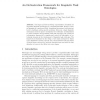Free Online Productivity Tools
i2Speak
i2Symbol
i2OCR
iTex2Img
iWeb2Print
iWeb2Shot
i2Type
iPdf2Split
iPdf2Merge
i2Bopomofo
i2Arabic
i2Style
i2Image
i2PDF
iLatex2Rtf
Sci2ools
MTSR
2015
Springer
2015
Springer
An Orchestration Framework for Linguistic Task Ontologies
Ontologies provide knowledge representation formalism for expressing linguistic knowledge for computational tasks. However, natural language is complex and fluid, demanding fine-grained ontologies tailored to facilitate solving specific problems. Moreover, extant linguistic ontological resources ignore mechanisms for systematic modularisation to ensure semantic interoperability with task ontologies. We present an orchestration framework to organise and control the inheritance of ontological elements in the development of linguistic task ontologies. The framework is illustrated in the design of new task ontologies for Bantu noun classification system. Specific use is demonstrated with annotation of lexical items connected to ontology elements terms, and with the classification of nouns in the ABox into noun classes.
Related Content
| Added | 15 Apr 2016 |
| Updated | 15 Apr 2016 |
| Type | Journal |
| Year | 2015 |
| Where | MTSR |
| Authors | Catherine Chavula, C. Maria Keet |
Comments (0)

